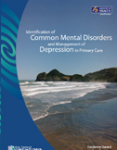Publications relating to mental health in New Zealand, including suicide prevention.
The Second Maori Mental Health and Addiction National Strategic Framework 2008-2015 reinforces current mental health and Māori health policy. This includes the overall aim of He Korowai Oranga, and whānau ora: Māori families supported to achieve their maximum health and wellbeing, and Te Tāhuhu - Improving Mental Health.

